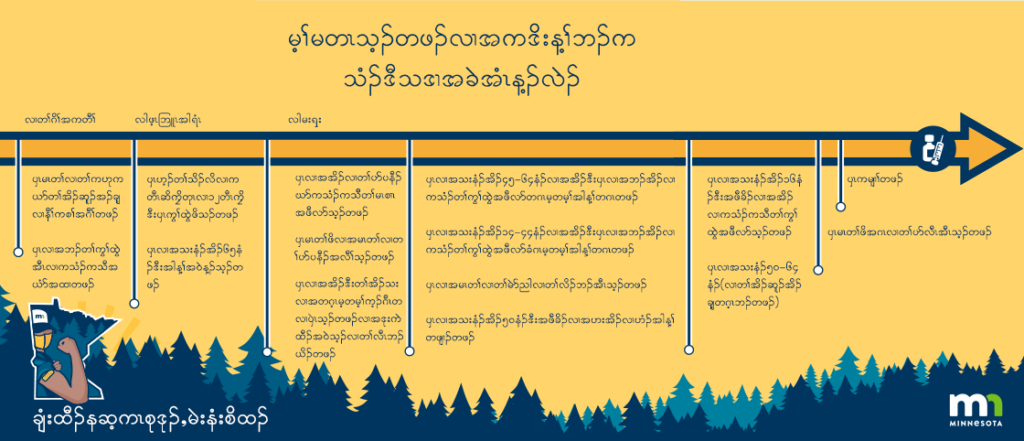
How can I get the vaccine?
There are currently three vaccines in distribution – the Moderna, Pfizer, and Johnson and Johnson & Johnson vaccines. The Moderna and Pfizer vaccines require two injections, while the Johnson and Johnson requires only one. For two injection vaccines, a person will receive their first shot, then come in again between 3 and 4 weeks later for their second dose. Both shots are necessary to be completely protected.
To find out when you’re eligible for the vaccine, sign up for the Minnesota Department of Health’s Vaccine Connector. The Connector alerts you when you’re eligible to get vaccinated, directs you to where to sign up, and informs you when opportunities to get vaccinated appear in your area. You can also check pharmacy websites, such as Walgreens, CVS, or Thrifty White to search for available appointment opportunities.
There is no cost for the COVID-19 vaccine. However, an administration fee may be billed to your insurance.
Who is prioritized?
Demand was projected to exceed supply in the first months of vaccine distribution. Therefore, guidelines were established to determine eligibility for the vaccine based on individual risk factors such as occupation, age, and underlying health issues. However, as of March 30th, every Minnesotan above age 16 is eligible for vaccination.
When can I get the vaccine?
As of March 30, every Minnesotan over the age of 16 is eligible for vaccination.

Can I get the vaccine if I’m pregnant?
Experts believe that the vaccines provide no specific risk to pregnant women. However, there is a shortage of research on the subject. What we do know is that pregnant women are at an increased risk for suffering severe illness from COVID-19 compared to non-pregnant people. Pregnant women can choose to get the vaccine. Making an appointment with your healthcare provider can be helpful, but is not required for vaccination.
Can I get the vaccine if I’m breastfeeding?
Currently, there is no evidence to support that mRNA vaccines can harm breastfeeding infants, although clinical trials did not include breastfeeding individuals, so there is little data available. The COVID-19 vaccines are not thought to pose a risk to breastfeeding people because they are mRNA, non-replicating vaccines. This means they create an immune response in the body without reproducing the virus inside host cells. If you would like to learn more about this, please visit the CDC’s website.
Candidates who should consult their healthcare provider before getting the vaccine include:
- People with a history of allergic reactions to vaccines or injections. People who have had anaphylaxis as a result of other medications should be watched after their COVID-19 vaccination for 30 minutes.
- People on blood thinners. People taking blood thinners should discuss whether to get the vaccine with their healthcare providers.
- Immuno-compromised people should consult with their doctors on whether it is safe for them to get the vaccine. Because of the risk of disease without the vaccine, the benefits of vaccination may outweigh the risks.
Who should NOT get the vaccine?
Candidates who should NOT get the vaccine:
- People with severe allergies to the ingredients in the COVID-19 vaccine. For instance, if a person will experience a reaction needing medical intervention, such as anaphylaxis, they should not get vaccinated.
- People who have experienced life-threatening effects of a previous dose of COVID-19 vaccine.
To get the Pfizer vaccine, you must be at least 16 years old. To get the Moderna or Johnson & Johnson vaccine, you must be at least 18 years old. So far, the Minnesota Department of Health has provided no guidance on whether children ages 12 through 15 can get the Pfizer vaccine, although Pfizer has stated it’s vaccine is safe and effective in children as young as 12. Media outlets such as CBS News and the Wall Street Journal are reporting that vaccinations to this age group will likely be available before the fall.
If you have had COVID-19 before, you should still get the vaccine when it becomes available to you. However, if you are still suffering from symptoms indicative of COVID-19, do not get the vaccine until your symptoms are gone and you have been quarantined for 14 days. If you received a positive COVID-19 test result, the Minnesota Department of Health says to wait 10 days since you felt sick before getting vaccinated. If you received antibody preparations during your COVID-19 illness, you must wait 90 days before getting vaccinated. Additionally, if you were vaccinated for something other than COVID-19, wait 14 days before getting your COVID-19 vaccination.
Common Questions about Vaccine Safety:
Will the vaccine change my DNA?
The vaccines will not alter your DNA, because they are mRNA vaccines. MRNA does not enter the nucleus of the cell where DNA is. The mRNA sends a signal to the cell to cause an immune response. After a few days, the mRNA will degrade, but by this time, the immune system has been prepared to combat COVID.
Who were the vaccines tested on?
A variety of individuals. Trials included adults over 18 years of age. 25% of Moderna and Pfizer trials included people over 65 years old. This number was 30% for Johnson and Johnson. A quarter of trial participants were also high-risk people with health problems like diabetes and cancer.
How did the vaccines get developed so quickly?
Researchers were able to take advantage of existing clinical trial networks and start manufacturing the vaccine as clinical trials occurred. This does not mean that vaccines were released to the public before trials were complete, only that the manufacturing in preparation for distribution was underway. In addition, there were more participants in the clinical trials, and because transmission of COVID-19 is high, researchers were able to observe the efficacy of their vaccines in a shorter timeframe.
What kind of reactions do people have to the vaccines?
Commonplace reactions include symptoms such as headaches, sore arm, fever, and body aches that appear within 48 hours of getting vaccinated.
Rare reactions include anaphylaxis, though this is extremely rare. For the Pfizer vaccine, this reaction only accounted for 21 cases out of 2 million. Moderna was similar, with only 1o cases out of 4 million doses.
Should I postpone getting the vaccine?
No. There have been over 60 million residents in the U.S. who have received their vaccination, and over 156 million globally. The vaccines are safe, and offer you protection from COVID-19.
Do I have to get the vaccine?
In the U.S., companies and organizations have not required people to get vaccinated.
Conclusion
Unfortunately, just because a vaccine is out doesn’t mean that we can stop observing public health measures. Social distancing, mask-wearing, and handwashing will be important until the vaccine allows the population to achieve herd immunity. Once herd immunity is achieved, the spread of COVID-19 will decrease and we can return to normal activity.
This is a confusing time. To find reliable information on COVID-19, please seek out reliable medical sources, such as the websites of the CDC, FDA, MDH, and M Health Fairview.
Sources:
M Health Fairview, Don’t hesitate, vaccinate
Minnesota Department of Health,COVID-19 Vaccine
Centers for Disease Control and Prevention, Information about COVID-19 Vaccines for People who are Pregnant or Breastfeeding
Wall Street Journal, Pfizer-BioNTech Covid-19 Vaccine 100% Effective in Study of 12-15 Year Olds, Companies Say
CBS News, Pfizer COVID-19 vaccine found safe and 100% effective in 12-15 year olds, company says
The New England Journal of Medicine, Addressing Vaccine Hesitancy in BIPOC Communities —
Toward Trustworthiness, Partnership, and Reciprocity


 (651)788-7593
(651)788-7593



